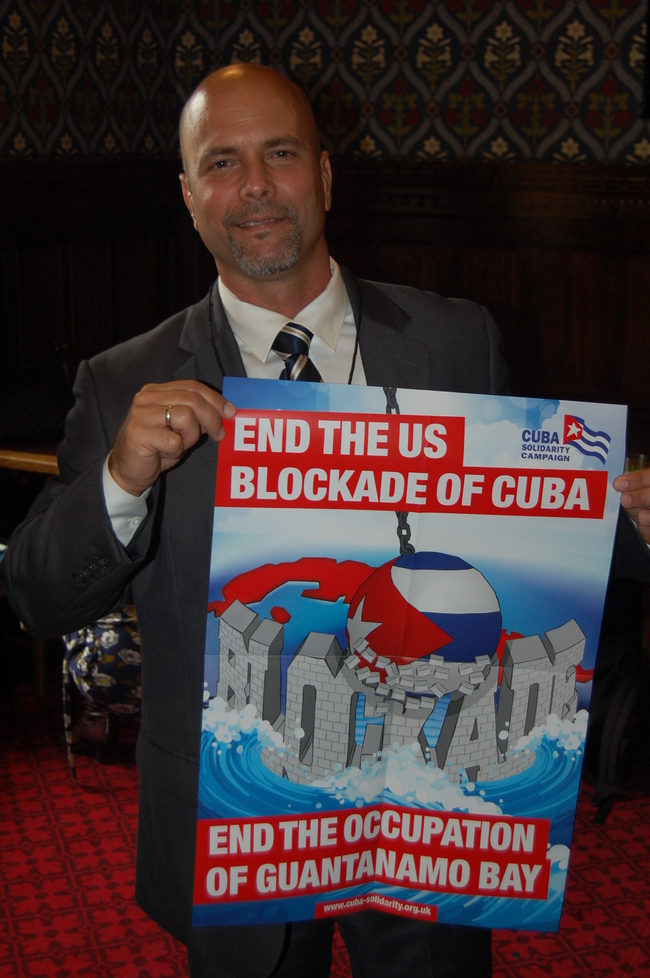A day many thought would never come
Morning Star | Saturday, 9 July 2016 | Click here for original article

GERARDO HERNANDEZ, one of the Miami Five, speaks exclusively to the Morning Star in advance of addressing the Durham Miners’ Gala today, together with his comrade Rene Gonzalez
GERARDO HERNANDEZ is looking forward to visiting Britain this week, especially to meet the thousands of British supporters who campaigned for his freedom.
“Most of all we are looking forward to meeting the many friends in Britain that supported our struggle for justice for more than 16 years. We owe our freedom to the many comrades who never let us down, who also supported our families and whose solidarity encouraged us to resist. This trip will be a great opportunity to express our gratitude to all of them.”
Gerardo — together with Fernando Gonzalez, Rene Gonzalez, Antonio Guerrero and Ramon Labanino — was unjustly imprisoned in 1998 for trying to prevent terrorist attacks against Cuba.
They received harsh sentences after infiltrating Florida-based groups responsible for violent actions and bombing campaigns against the island.
British trade unions and Cuba Solidarity Campaign activists were at the forefront of the international campaign for their release and took part in lobbying, speaking tours, vigils and much more.
For the first 18 months of their freedom, the men travelled across the island to meet the Cuban people. They were honoured with state visits to Venezuela, Bolivia and South Africa where they met the presidents of those countries, and travelled extensively through Europe to France, Spain, Germany, Portugal, Sweden and Moscow.
Frustratingly for British campaigners wanting to celebrate the Five’s release with them in Britain, it has taken more than two years and the involvement of 11 judges in immigration tribunals and the Court of Appeal before they received visas to enter Britain.
Rene Gonzalez was twice denied a visa by the British government on the grounds that he had spent more than four years in a foreign prison. The second refusal followed an invitation from 28 MPs to attend a meeting in Parliament.
However, in November 2015, following a legal battle, the Court of Appeal ruled that the refusals breached the MPs’ freedom to receive and impart information under Article 10 of the European Convention on Human Rights (ECHR).
The judges also refused to let the Home Office appeal against their decision at the Supreme Court.
Eventually the threat of a judicial review and urgent actions by CSC supporters and MPs appealing to the Home Office resulted in visas being issued just two days before the men and their families were due to fly.
Olga Salanueva and Adriana Perez, Rene and Gerardo’s partners, are travelling with their husbands. Both are familiar with Britain, having visited many times while their husbands were imprisoned to lobby and campaign on their behalf. Both were denied visas to visit the men in jails for more than 10 years.
Gerardo and Adriana are bringing their 18-month-old daughter, Gema, the “miracle baby” with them. Gema was born just three weeks after Gerardo’s release from prison.
Arranging the couple’s IVF treatment while Gerardo was still in prison formed part of the initial dialogue leading up to negotiations between the US and Cuba and finally rapprochment and re-establishing diplomatic relations on December 17 2014.
Adriana is now pregnant again and the couple are expecting twin boys.
The birth of his daughter is Gerardo’s own personal highlight of the last 18 months, but there have been many that they have all shared, he says: “Reuniting with our families and our people after so many years apart; receiving the Heroes of the Republic of Cuba decoration from Raul Castro himself; meeting with Fidel for almost five hours; being honoured by our people every day, everywhere we go.”
All five are now moving into full-time work as they are keen to “contribute to the development of our society,” says Gerardo.
Fernando is vice-president of the ICAP, the Cuban Friendship Institute which works with the international solidarity movements; Ramon is vice-president of ANEC (Cuba’s National Association of Economists), Antonio is vice-president of a project company at the Construction Ministry, Rene is vice-president of the Jose Marti Cultural Association, and Gerardo is vice-rector of the Higher Institute of International Relations, Cuba’s diplomatic academy.
The visit comes at a pivotal time in Cuba’s history. Rene and Gerardo will speak about their time in US jails, how international solidarity helped free them, the current situation with US-Cuba relations and why solidarity with Cuba is just as important as ever while the US blockade remains in place and Cuban land at Guantanamo is illegally occupied.
With regards to President Barack Obama’s recent visit to Cuba, Gerardo views it as a victory for the Cuban people: “We can disagree with the things that Obama said during his visit but the fact is that it was a historical event. And it also was a triumph for the people of Cuba. For many, many years different US administrations kept saying that the US would never negotiate with Cuba while the revolution was in power; while ‘the Castros’ were in power; while Cuba wouldn’t renounce its commitment to building a socialist society, and many other preconditions like these. None of which happened — and still a US president visited Havana.
“Obama might have wanted to give us a ‘bear hug,’ but the fact that he visited is a victory for the Cuban people and their resistance over more than half a century.”






